

Tools, Publications & Resources. Skip to main content Review Resources Selection & Reconsideration Policy Toolkit for Public, School, & Academic Libraries.
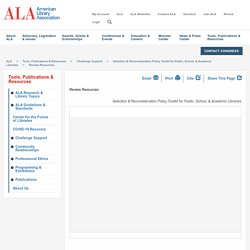
Content Curation by Robin Good. Tools, Publications & Resources. Acquisitions and Management of Knowledge and Information. After completing this session, you'll be able to: identify the key players in building and managing collections. discuss how creators, editors, publishers, reviewers, and booksellers connect to building and managing library collections.
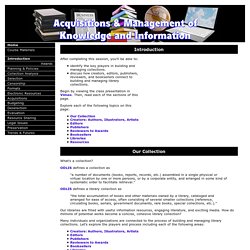
Begin by viewing the class presentation in Vimeo. Acquisitions and Management of Knowledge and Information. Weeding the Worst Library Books. Last summer, in Berkeley, California, librarians pulled roughly forty thousand books off the shelves of the public library and carted them away.
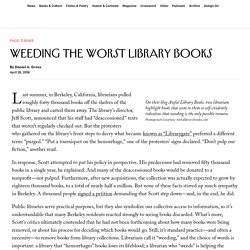
The library’s director, Jeff Scott, announced that his staff had “deaccessioned” texts that weren’t regularly checked out. But the protesters who gathered on the library’s front steps to decry what became known as “Librarygate” preferred a different term: “purged.” “Put a tourniquet on the hemorrhage,” one of the protesters’ signs declared. Awful Library Books - Hoarding is not collection development.
WebJunction Catalog: Collections Management. Assignment 2: Collection development policy response paper. Assignment Introduction and Slides Objectives: Students will evaluate two collection development policies for strengths and weaknessesStudents will practice professional communication skills in writing a concise analytical response paper This paper will be based on your responses to two collection development policies that you compare and contrast in terms of content, usefulness, and suggestions for improvement.
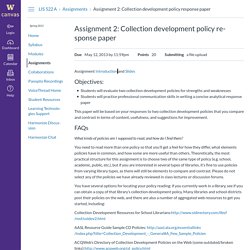
FAQs What kinds of policies am I supposed to read, and how do I find them? School Library Policies - School Libraries. Joyce Valenza on School Librarianship.
FRIT7332Part2. Ls5443 / Module_3_2. Created at Wordle.net.
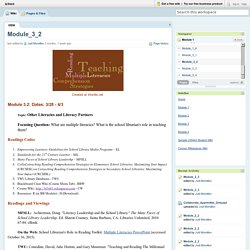
Get Lesson Plans. Living in the library world: October 2008. On October 1, 2002, I received another letter from the college, which read as follows: Re: Library and Information Technology The Selection Committee would like you to attend an orientation interview.
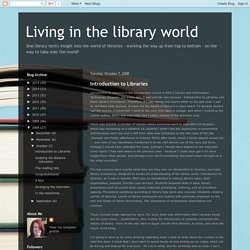
The interview will provide you with information about the various aspects of the program, the curriculum including the practicum placements, program costs, employment prospects, etc. The interview will take approximately 20 minutes. Following this you will be asked to complete a short writing assignment and a *keyboarding test. 1. Online Learning Today - eduMOOC: Online Learning Today... and Tomorrow. We begin the week with an orientation to where online learning fits into higher education today.
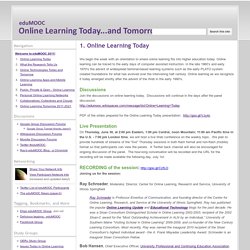
Online learning can be traced to the early days of computer assisted instruction. In the late 1960's and early 1970's the advent of widespread terminal-based learning systems such as the early PLATO system created foundations for what has evolved over the intervening half century. Online learning as we recognize it today emerged shortly after the advent of the Web in the early 1990's. Live Presentation On Thursday, June 30, at 2:00 pm Eastern, 1:00 pm Central, noon Mountain; 11:00 am Pacific time in the U.S. - 7:00 pm London time, we will host a live Web conference on the weekly topic. EI Procedures Guide Chapter 2 Copy Cataloging.
Basic Book Cataloging Procedures. Fantastic free cat tools 101112. School101main. School Library 101. 20+ Awesome Free Online Librarian Courses. Librarians have far more responsibilities than many people actually realize.
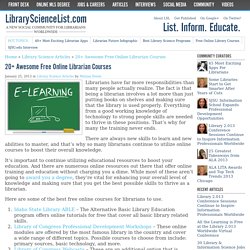
The fact is that being a librarian involves a lot more than just putting books on shelves and making sure that the library is used properly. Everything from a good working knowledge of technology to strong people skills are needed to thrive in these positions. That’s why for many the training never ends. There are always new skills to learn and new abilities to master, and that’s why so many librarians continue to utilize online courses to boost their overall knowledge. It’s important to continue utilizing educational resources to boost your education. Ft. Vancouver High School Library Media Center 04. Unshelved by Gene Ambaum and Bill Barnes. Computer-based Information Tools. Learning Objectives • Define library catalog. • Define Online Public Access Catalog (OPAC) and provide examples. • Define union catalog. • Define WorldCat by OCLC and provide examples of how it can be used. • Identify the options for searching WorldCat. • Define cataloging standards. • Define AACR2 and RDA. • Identify the basic functions and tools of bibliographic control. • Describe how bibliographic records are using in cataloging. • Define types of cataloging. • Define cataloging and the types of cataloging records.
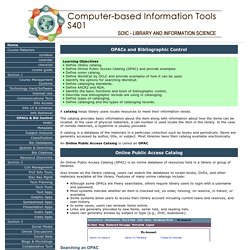
A catalog helps library users locate resources to meet their information needs. The catalog provides basic information about the item along with information about how the items can be located. In the case of physical materials, a call number is used locate the item in the library. In the case of remote materials, a hyperlink is usually provided.
A catalog is a database of the materials in a particular collection such as books and periodicals. Searching an OPAC. Parts of the Book. AbeBooks Explains the Parts Of A Book. Uploading MARC records to Destiny. Cataloging ILB books in Destiny. Destiny Cataloging. Elementary Library Lesson #3 - Fiction Book Organization (Edgerton School District) Program Administrator - Renae Evans - Portfolio. Celebrating Picture Book Month with the 2014 Picture Book Smackdown. Our 2014 Picture Book Smackdown was a huge success.
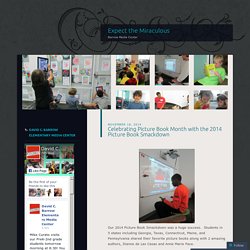
Students in 5 states including Georgia, Texas, Connecticut, Maine, and Pennsylvania shared their favorite picture books along with 2 amazing authors, Dianne de Las Casas and Anne Marie Pace. Anytime you host an event like this, you worry about technical difficulties. However, today the internet gave us smooth sailing. I do want to take a moment to uncover some of the pieces that went into making this event successful. There was a lot of preparation that went on behind the scenes. I created our Google Plus Hangout on Air event page well in advance so that we could advertise our smackdown to all of our networks.All of the authors and participating schools have been communicating with one another via email, twitter, and a shared Google doc.
All of the participating schools had students prepare in advance. LISTSERV 16.0 - LISTSERV Archives at LISTSERV.SYR.EDU. Published Homepage. Caveman Dewey. Banned in My School. GOSA_reading_mentor_web_FINAL_2013. Weeding for School Libraries by Kristy Gates. The 'W' Word: Weeding! Weeding the Collection Bibliography. These are resources on weeding. Renew Your Support for Intellectual Freedom with Sept/Oct 2015 Issue. The September/October 2015 Knowledge Quest issue is coming to your mailbox just in time for Banned Books Week and Banned Websites Awareness Day. The theme is “Intellectual Freedom–Enduring Values in a Changing World.” Many things have changed in K-12 education and school libraries, but the issues of access and equity, filtering, challenges to library resources, protecting students’ privacy, and labeling persist. The principles of intellectual freedom are as important as ever. Policies up-to-date? Pentlin on blocking web sites. Two examples made me start thinking about this issue [reconsideration of blocked websites].
I use Skype in my library science classes and one of my students said she couldn’t use Skype at school. She had found this out when she wanted to Skype her husband who was serving in Afghanistan The district refused to let her use Skype even after school to participate in a graduate class or to contact her husband. It doesn’t take much reading to realize that Skype, Twitter, YouTube, and Facebook are being blocked by a number of school districts even though there are many examples in the literature of effective educational use social media.Not too long ago a school district near me systematically blocked any Web sites that dealt with homosexuality. I am happy to see AASL continue the work of eliminating the censorship of online tools and resources.
Although digital resources still only get a day, while banned books (those old-fashioned paper things) get a whole week, the work does continue. Filtering and hypercompliance. The guy who does my taxes says that good citizens pay every penny they owe - but not one penny more. That pretty well summarizes a sensible view of compliance with any law. Follow it, but don't go overboard. A driver is not more law-abiding by going 10 mph under the speed limit. Unfortunately, too many technology decision-makers "hyper-comply" with CIPA.
Filtering webinar this Wednesday - join us. » 7 Myths About Internet Filters AASL Blog. Posted by hadams in Banned Websites Awareness Day, Check this out!. Trackback Seven Myths about Internet filters by Doug Johnson dougj@doug-johnson.com and I am very happy AASL isaddressing the issue of filtering and intellectual freedom. It’s been a hottopic for me personally for over 15 years. Strategies for Fighting Internet Filtering. EduKindle - eReaders for Educators. Library Journal’s SELF-e Select Announced. The first of Library Journal’s curated collections, SELF-e Select, to be released in June Library Journal’s initial curated collection of self-published ebooks, SELF-e Select, will be available on BiblioBoard Library in advance of the ALA Annual Conference in June. Cipa_report. The 'W' Word: Weeding! Weeding Not Just for Gardens. Weeding Presentation. Attack Your Collection: Weeding with CREW.
Collection evaluation. SELCOtv - Awful Library Books Weeding Workshop - part 1. Culling Your Collection: The Fine Art of Weeding. Weeding your School Library. Collection Evaluation and Weeding. Why Choose History? Our recent conversion to Common Core standards makes our non-fiction collection a vital piece of our curriculum. Teachers are always asking for more science and history texts to use in their classroom.
Our sixth and seventh grade social studies standards also focus on Europe, Asia, and Africa, so we need this section of the media center to be current and up to date. Because many of these books are related to specific countries, we want to make sure that the titles are up to date, given world events over the past fifteen years. The standards require that students understand how governments, economic systems, politics, and recent change affect each country. I am hoping to completely revamp the history section of our media center to be engaging and useful to students.
Home - Doug Johnson's Blue Skunk Blog. Library Collection Development. Tour of Library Collection. Eclection - Collection Development. Trends in Collection Development. Policies & procedures: Developing Library Collection Policies. Lecture 1c: Collection Development. Collection Development Policy, ISACS October 2014. Selection & acquisitions 2007. Selection & acquisitions 2007.
Literacy_web_bubble2-copy.jpg (JPEG Image, 4500 × 3300 pixels) - Scaled (22%) Sketchnote Army - A Showcase of Sketchnotes. Ls3013 [licensed for non-commercial use only] / CS4TRC. Ls5233 [licensed for non-commercial use only] / FrontPage. Word Cloud Created at Wordle.net. Ls3013 [licensed for non-commercial use only] / CS4TRC. Impact: How-to Chapters. Lis773 / Reading. 21stCenturyStandardsBootCamp. Lis773 / Reading. Ls3013 [licensed for non-commercial use only] / CS4TRC. The School Library Media Specialist. A school is a learning community. Each teacher and child comes with a unique set of experiences that contribute to the community of learning. The school library media center offers a wide variety of resources and opportunities. However, the enthusiastic leadership of a teacher librarian is essential to bring the potential of information and learning resources alive for both teachers and students.
Designed primarily as a tool for a university course at Indiana University at Indianapolis, this website is available to anyone who wants to learn more about the role of the school library media specialist in today's schools. Reading LIS773. ***LAPR - Collection Development Training-*** Marketing Your Library! Lecture 1c: Collection Development. Resource and Space Management. Collection Development Policy, ISACS October 2014. Selection and acquisitions. Policies & procedures: Developing Library Collection Policies. Collection Building In The School Library Media Center. Lecture 1c: Collection Development.
Palisades High School Library Annual Report 2014-2015. FREE TRAINING. A Book and a Hug - Reader Assessment. To find out what kind of a reader you are... what reading personality you match, just take this ten question assessment. Make yourself an answer sheet numbered one through ten. Then, select the letter of the answer that feels most like who you are and write that letter next to the number of the question. When you are finished with all ten questions, click on the answer sheet. This assessment will help you find out if you are a Belonger Connector, Jokester, Seeker or Answerman if you are a boy and if you are a Heart/Home/Friends Forever, Joan of Arc, Wild Thing or Investigator/Analyst if you are a girl. Then you can search abookandahug using your reading personality and your reading level to find books that match your preferences.
There are no right or wrong answers. Now that you've completed the assessment, take a look at the Answer Key. A Book and a Hug - Reader Assessment. All Voices Heard, All Ideas Considered - ApprenNet. I teach 100% online. ApprenNet helps me build community in our courses. Reading Workshop: The School Librarian’s Role. Position Statement on the School Librarian's Role in Reading. Rationale: Reading is a foundational skill for 21st-century learners.